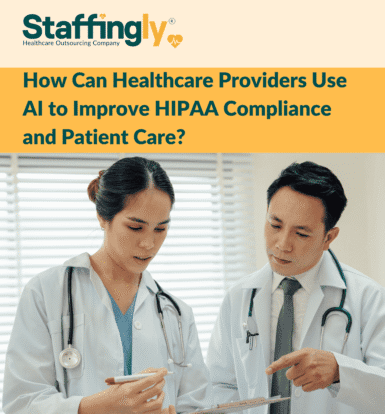On-Demand Outsourcing BPO Services for Healthcare Providers With 24/7 Coverage!
Save up to 70% on staffing costs!
Browse Specialty Staffing Services
How Can Healthcare Providers Use AI to Improve HIPAA Compliance and Patient Care?
Artificial intelligence (AI) is transforming healthcare by improving patient outcomes, streamlining operations, and ensuring compliance with regulations like the Health Insurance Portability and Accountability Act (HIPAA). As healthcare organizations manage vast amounts of sensitive patient data, AI offers innovative solutions to maintain HIPAA compliance while elevating the quality of care. This article explores how AI can help healthcare providers achieve both objectives effectively. Strengthening Data Security and Privacy with AI HIPAA mandates strict protection of protected health information (PHI). AI

Can Healthcare Providers Offer Support Beyond Office Hours?
In today’s fast-paced world, healthcare doesn’t stop when the office closes. As the demand for 24/7 services grows, many patients expect continuous access to healthcare advice, care, and support. Whether it’s a late-night medical question, an urgent need for prescription refills, or concerns about symptoms, healthcare providers are increasingly being asked to offer support beyond traditional office hours. The question is: can they, and should they? The Growing Need for After-Hours Healthcare Support With busy schedules, increasing work hours, and

How Does Cross-Channel Support Reduce Escalation Errors in Healthcare?
In healthcare, effective communication is crucial to ensuring quality care and patient satisfaction. One of the challenges healthcare organizations face is managing patient inquiries, issues, or requests across multiple channels without causing confusion, delays, or errors. Cross-channel support, the practice of providing consistent and unified support across various communication platforms, is an essential solution to this problem. By ensuring that information flows seamlessly between channels, cross-channel support can significantly reduce escalation errors and improve overall healthcare delivery. What Is Cross-Channel

How Can Prior Authorization Scheduling Enhance HIPAA Compliance in Healthcare?
In healthcare, managing patient data securely while ensuring compliance with regulations like the Health Insurance Portability and Accountability Act (HIPAA) is critical. Prior authorization (PA), a process requiring insurance approval before certain procedures or medications are administered, is a key component of healthcare operations. When managed effectively, prior authorization scheduling can enhance HIPAA compliance by safeguarding protected health information (PHI). This article explores how streamlined prior authorization processes can support HIPAA compliance in healthcare settings. Prior Authorization and HIPAA Compliance

How Do Healthcare SOP Audits Maintain Efficiency in Call Workflow Systems?
In the fast-paced healthcare industry, call workflow systems are essential for managing patient interactions, streamlining operations, and ensuring high-quality service delivery. From appointment scheduling to insurance verification and medical inquiries, these systems are the backbone of efficient patient communication. However, without well-defined Standard Operating Procedures (SOPs) and regular SOP audits, call workflows can become disorganized, inefficient, and prone to errors. This article explores the critical role of SOP audits in healthcare call centers, their benefits, and best practices to optimize

How We Avoided Healthcare Compliance Issues with Deep Encryption Vetting?
In the healthcare industry, safeguarding sensitive patient information is a top priority. With increasing regulatory pressures and the growing risk of data breaches, healthcare organizations must implement robust encryption protocols to ensure that confidential patient data is protected. One of the most effective strategies to avoid healthcare compliance issues is through deep encryption vetting, a comprehensive process that not only ensures data security but also helps healthcare organizations stay compliant with regulatory standards. The Importance of Healthcare Compliance Healthcare compliance

How Do Healthcare Agents Perfectly Follow Our Specialty Language?
In healthcare, effective communication is critical to ensuring the highest level of care for patients. The ability of healthcare agents to understand and use specialty-specific language plays a vital role in achieving this goal. Whether it’s medical terminology, clinical guidelines, or the nuances of patient care protocols, healthcare agents must be well-versed in the language of their particular specialty to ensure smooth interactions, accurate documentation, and optimal patient outcomes. But how exactly do healthcare agents perfect this skill? What Is

Hospital Claims Workflow Visibility for Revenue Protection
The healthcare industry, particularly in hospitals, faces constant pressure to maintain accurate and efficient claims workflows. The complexity of medical billing, combined with the variety of insurance providers, codes, and regulations, makes it increasingly difficult for hospitals to effectively manage claims and ensure timely payments. Without proper visibility into the claims workflow, hospitals risk delays, denials, or errors that can negatively impact revenue generation and overall financial health. In this article, we will explore the importance of hospital claims workflow
 Book a Demo to Build Your Team Today!
Book a Demo to Build Your Team Today!


 Read Case Studies
Read Case Studies 



 Virtual Medical Assistants
Virtual Medical Assistants



